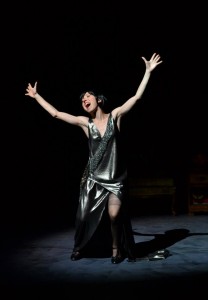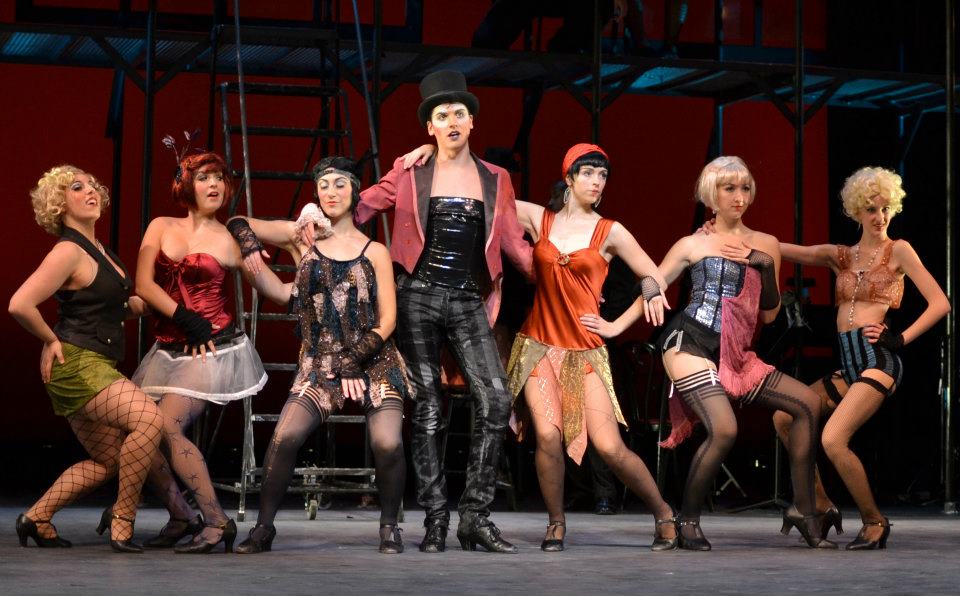
Joanna Volpe, Nina Filipowich, Gia Salerno, Doug Atkins, Rebecce Knoll, Alison Sharp, Meg Stefanowicz in West Chester University's CABARET, running through October 29. (Photo credit: Annie Walters)
Over the past year numerous productions of the provocative musical CABARET have popped up all over the tri-state area. (Indeed, yet another will open at Forge Theatre in Phoenixville next month.) This isn’t particularly surprising, given Kander and Ebb’s well-renowned score and the seductively engaging dance numbers has made the show an audience favorite for decades. It’s a challenging musical on all fronts, requiring strong talent and creativity by both the cast and the director. Consequently, it’s not uncommon for there to be inconsistency in nonprofessional productions. West Chester University’s production, running through October 29, bucks the trend and stands as one of the best implementations of the show I’ve seen.
The plot follows American starving author Cliff Bradshaw (Patrick Moran), who travels to Germany in 1929 to find inspiration for his next book. He meets up with some of the locals, most notably the bold and saucy British performer at the popular Kit Kat Club, Sally Bowles (Beth Serowsky). Cliff’s conservative and practical demeanor starkly clashes with Sally’s carefree personality and bawdy lifestyle, which naturally makes them a perfect romantic pair. In the midst of their passionate fling, however, Germany’s new fascistic political body starts to rear its ugly head—subtly at first, but ultimately building to a level that cannot be ignored. And suddenly the party is over.

Beth Serowsky as Sally Bowles in West Chester University's excellent production of CABARET. (Photo credit: Annie Walters)
CABARET cleverly intersperses musical numbers throughout, many taking the form of performances at the Kit Kat Club, which highlight the motifs currently being expressed in the plot. At the heart of these transitions is the enchanting and charismatic Emcee (Douglas Atkins), who welcomes the audience to the show and guides us along the journey. Atkins is simply magnetic. He capably dishes out the ample humor in heavy doses with a great sense of comic timing and also reveals a darker side as the musical progresses.
At first I was unsure about the casting of Serowsky as Sally, but to my delight she delivered perhaps the strongest interpretation of the character I’ve witnessed, believably rendering the varied complexities of the role. The cast’s voices, under the solid music and vocal direction of Christopher Tolomeo and Jesse Padgett, respectively, impressed overall, but Serowsky again deserves special mention. The raw emotional prowess and dynamic vocal power she displayed in the title number late in Act II soared beyond any superlative I can offer. All the characters are forced to make a choice by the show’s end, many of which are doomed to failure, and Sally’s is especially heart-breaking. The remainder of the cast (unfortunately too numerous to mention here) similarly shined. As far as I could discern, there wasn’t a lacking performance to be found.
The strong production elements included the dynamic choreography by Liz Staruch (such as the great “Two Ladies” number), the cleverly functional two-story skeleton set designed by Joan Mary Morgan, and the creative use of lighting by designer Juliet Wunsch. The show’s pacing was tight and the sound nearly flawless. And yes, the orchestra was beautiful. Certain actors’ accents faltered on occasion, but they worked well in general. During a couple scenes, certain actors sing portions of their solos from halfway back in the audience. This was fine for me, since I sat in the back section, but those in the front would have to crane their necks to see what was happening. Often audiences are reluctant to do this, and I noticed this show was no exception.

Ricky Rotandi, Joanna Volpe, Meg Stefanowicz, Alison Sharpe, Beth Serowsky, Doug Atkins, Gia Salerno, Nina Filipowich, Rebecca Knoll, Ben Cramer, Tony Mottola in a scene from WCU's outstanding production of CABARET, running through October 29. (Photo credit: Annie Walters)
What I admired most about WCU’s production was director Emily Rogge’s smart use of certain ensemble members as “voyeurs”. These actors were fluidly involved in the background throughout the show, watching scenes between, i.e. Cliff and Sally, unfold from the shadows, as if they were at the Kit Kat Club attending a show. As the story darkens and the Nazi presence becomes more pronounced, however, the voyeurs transform and gradually disappear from the stage until ultimately only the Emcee remains. They make a memorable reappearance at the end, stripped of their gleeful demeanor, as they rush about in a paranoid frenzy. Due to Rogge’s intelligent staging, the voyeurs’ movements didn’t upstage the main action, and their performances effectively enhanced the musical’s “end of a tranquil era” theme.
Regretfully, WCU’s CABARET has a short run, and this coming weekend is your last chance to catch this enthralling and multifaceted production.
CABARET
Book by Joe Masteroff
Music by John Kander
Lyrics by Fred Ebb
thru October 29, 2011
WCU Department of Theatre & Dance and University Theatre
Directed by Emily Rogge
West Chester University
Swope Performing Arts Center
817 South High Street
West Chester, PA 19382
610-436-2533
http://www.wcupa.edu/cvpa/theatredance



4 comments
Hi! My name is Annie Walters, I took the pictures featured in this article and did not see credit posted anywhere. Just wanted to throw that out there! The show is awesome!
Hi Annie – STAGE was not given that information when we were sent the pics – but we’ll be happy to post it now that we have the info! – Patricia Bradford, Managing Editor
thanks so much!!
Not only a great actor-director-lawyer but also a great writer and critic. Please come be in my play!